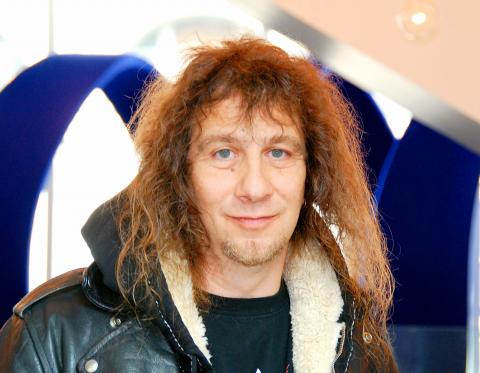Canadian heavy metal band Anvil got their start 34 years and 14 studio albums ago. Their highly influential sound struck a chord with many metal heavyweights like Megadeath, Metallica, Slayer, and Anthrax, but Anvil never made it big until recently, when a documentary which highlighted their struggles as a band was released to rave reviews around the world. This weekend, Urban Nomad will be screening Anvil! The Story of Anvil three times at the Canada Day celebration at the Huashan 1914 Creative Park (華山1914文創園區), and Anvil will take to the stage at Legacy on Sunday night.
The Taipei Times caught up with founding member of Anvil, Steve “Lips” Kudlow, via email to discuss heavy metal music today, what it’s like to finally have your dreams come true, and representing Canada all the way in Taiwan.
Taipei Times: Do you pay attention to current metal and rock and roll? What do you think of the state of metal at the moment?

Photo Courtesy of Anvil
Lips: I sometimes listen to something new but rarely enjoy it. For me good or listenable metal has to have a strong powerful feel that is consistent and steady with a memorable level of melody. I think a lot of metal music in this day and age lacks these qualities.
TT: How has your definition of metal changed over the years?
Lips: My personal definition of metal has not changed. I still love and listen to the music I grew up with and continue to be inspired to create in the same vein. Metal is a timeless format of music. What was good 40 years ago is still good today. Case in point — Black Sabbath.

Photo: Bloomberg
TT: What is your favorite Anvil song? Why?
Lips: My personal favorite is Swing Thing on the newest CD, Juggernaut of Justice. This is because this song has broken musical barriers and is extraordinarily unique. Speed metal crossed with big band swing. This is something I had never heard before and had the will, desire and drummer to make it really come to life.
TT: You and Anvil co-founder, drummer Robb Reiner, have been through the highs and the lows of Anvil. Was there ever a time when you thought that you two would never be friends again? What happened? How did you make up?
Lips: For whatever reason, we have never been faced with this type of breakdown. We certainly can have arguments and even sometimes push each other around but never to the point that would cause permanent damage physically or emotionally. There is a true honest friendship between us and even at the worst of times we have been able to resolve our differences.
After the heavy metal boom fizzled out in the late-1980s, Anvil still made albums but toiled in obscurity until a former roadie nicknamed “Teabag”, Sacha Gervasi, decided in 2005 to film a documentary about the band going on tour in Europe and recording their 13th studio album, This is Thirteen. Anvil! The Story of Anvil premiered at Sundance Film Festival in 2008 and ended up winning a slew of global awards. More importantly, the members of Anvil got to ride another wave of popularity and could finally quit their day jobs.
TT: What kind of credit do you give Sacha Gervasi for putting you guys back on the map and into people’s consciousness?
Lips: It isn’t easy to quantify how much gratitude I feel toward Sacha. He is a dear friend, and even more like my little brother. We help each other and have enormous respect for each other. We shared success with each other and this is a very powerful bond. We continue to be very close friends and probably will be for the rest of our lives.
TT: Now that you are touring again, have you ever run into the problems of venues or promoters not paying you like you did in the documentary?
Lips: No, that hasn’t been happening and I must say it was very unusual that it even happened in the film. That was the first time I had to do that in all the years I’ve been doing this. I didn’t know I was being filmed when it happened, but even if I did I just wanted to be paid for our work! The world of clubs I’ve played are more honest than most people think. Sacha caught an unusual moment but generally it doesn’t happen even to the worst of bands!
TT: After the documentary came out, did you instantly start getting booked again or did it take a while before you felt like you would be comfortable leaving your job in the food delivery business?
Lips: It wasn’t over night. I had to quit the deliveries but began working for my sister at her husband’s air conditioning refrigeration company doing filing. This way I could come and go freely until it became impossible to be there at all. I was working there for about a year until the movie came out and we began touring all over the world.
TT: Anvil is playing in Taiwan to celebrate Canada Day. Do you know much about Taiwan at all? How do you feel about celebrating Canada Day in a foreign country?
Lips: I really don’t know much about Taiwan and this is going to be a huge learning experience for us. We are so greatly honored to be included in such a special event. I am a very proud Canadian and it is an honor and privilege to know Canadians are proud of me.
TT: What can the local audience expect when they see Anvil in concert? Is it easy to connect with an audience that doesn’t speak English?
Lips: You can expect a show of great entertainment and musicianship. We have never had a problem connecting with an audience that doesn’t speak English as a first language. From the earliest shows we played in French speaking Canada to shows everywhere around the world. The language of our performance is universal.
Film Notes:
What: Anvil! The Story of Anvil
When and where: Screening times are Saturday June 30 at 7pm and Sunday July 1 at 1:30pm (with a Q&A session with Anvil afterwards) and 4pm. All screenings will take place in Building 2 East A (2東A ), Huashan 1914 Creative Park (華山1914), 1 Bade Rd Sec 1, Taipei City (台北市八德路一段1號).
Admission: Tickets are NT$150 per screening and the first 50 people at each screening with a ticket for the Anvil concert get in free.
Performance Notes:
What: Anvil concert
When and where: 8pm, Sunday July 1 at Legacy Taipei, Huashan 1914 Creative Park (華山1914), Center Five Hall (中五館), 1 Bade Rd, Sec 1, Taipei City (台北市八德路一段1號).
Admission: Tickets are NT$1,200 and can be purchased at the door, www.walkieticket.com, or at 7-11 iBon or FamiPort.

In the March 9 edition of the Taipei Times a piece by Ninon Godefroy ran with the headine “The quiet, gentle rhythm of Taiwan.” It started with the line “Taiwan is a small, humble place. There is no Eiffel Tower, no pyramids — no singular attraction that draws the world’s attention.” I laughed out loud at that. This was out of no disrespect for the author or the piece, which made some interesting analogies and good points about how both Din Tai Fung’s and Taiwan Semiconductor Manufacturing Co’s (TSMC, 台積電) meticulous attention to detail and quality are not quite up to

April 21 to April 27 Hsieh Er’s (謝娥) political fortunes were rising fast after she got out of jail and joined the Chinese Nationalist Party (KMT) in December 1945. Not only did she hold key positions in various committees, she was elected the only woman on the Taipei City Council and headed to Nanjing in 1946 as the sole Taiwanese female representative to the National Constituent Assembly. With the support of first lady Soong May-ling (宋美齡), she started the Taipei Women’s Association and Taiwan Provincial Women’s Association, where she

Chinese Nationalist Party (KMT) Chairman Eric Chu (朱立倫) hatched a bold plan to charge forward and seize the initiative when he held a protest in front of the Taipei City Prosecutors’ Office. Though risky, because illegal, its success would help tackle at least six problems facing both himself and the KMT. What he did not see coming was Taipei Mayor Chiang Wan-an (將萬安) tripping him up out of the gate. In spite of Chu being the most consequential and successful KMT chairman since the early 2010s — arguably saving the party from financial ruin and restoring its electoral viability —

It is one of the more remarkable facts of Taiwan history that it was never occupied or claimed by any of the numerous kingdoms of southern China — Han or otherwise — that lay just across the water from it. None of their brilliant ministers ever discovered that Taiwan was a “core interest” of the state whose annexation was “inevitable.” As Paul Kua notes in an excellent monograph laying out how the Portuguese gave Taiwan the name “Formosa,” the first Europeans to express an interest in occupying Taiwan were the Spanish. Tonio Andrade in his seminal work, How Taiwan Became Chinese,